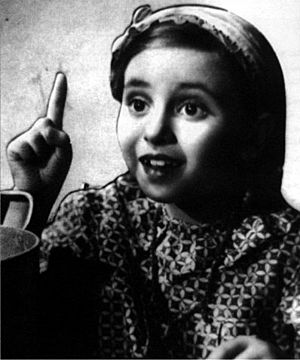Faten Hamama facts for kids
Quick facts for kids
ORE
Faten Hamama
|
|
|---|---|
| فاتن حمامة | |
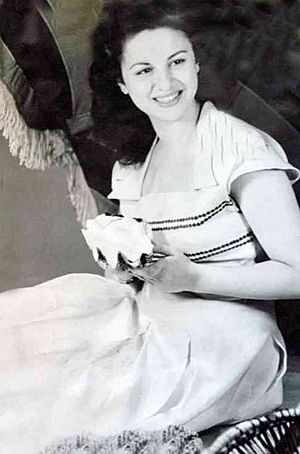
Faten Hamama in 1950
|
|
| Born |
Faten Ahmed Hamama
27 May 1931 |
| Died | 17 January 2015 (aged 83) Cairo, Egypt
|
| Nationality | Egyptian |
| Other names | "The First Lady of Egyptian and Arabic Cinema" |
| Occupation |
|
| Years active | 1940–2001 |
| Spouse(s) |
Mohamed Abdel Wahab Mahmoud
(m. 1975) |
| Children | 2 |
| Relatives | Omar Sharif Jr. (grandson) |
| Honours | |
Faten Ahmed Hamama (Arabic: فاتن حمامه; 27 May 1931 – 17 January 2015) was a famous Egyptian actress and film producer. She was known as "The First Lady of Egyptian and Arabic Cinema" because of her huge impact. She started acting when she was only seven years old.
Faten Hamama helped make the film industry in Egypt much better. She also showed how important women were in movies and in Egyptian society. In 2000, she was named "Star of the Century" by Egyptian writers and critics. Many of her films are considered among the best in Egyptian cinema history.
Contents
Early Life and First Roles
Faten Hamama was born in 1931 in Mansoura, Egypt. She had an older brother, Mounir, and two younger siblings, Layla and Mazhar. Faten loved acting from a very young age. When she was six, her father took her to see a movie. She felt like the audience was clapping for her!
When Faten won a children's beauty contest, her father sent her picture to director Mohamed Karim. He was looking for a young girl to act with the famous musician Mohamed Abdel Wahab in the film A Happy Day (1939). Faten got the role, and people started calling her "Egypt's own Shirley Temple." The director was so impressed that he signed a contract with her father.
Faten continued to act in films like Bullet in the Heart (1944) and Dunya (1946). After these successes, she moved to Cairo with her family. In 1946, she began studying at the High Institute of Acting.
Becoming a Star
Youssef Wahbi, a well-known Egyptian actor and director, saw Faten's talent. He gave her a main role in the 1946 film Angel of Mercy. Faten was only 15, but her dramatic acting made her very famous. She then starred in three more successful films with Wahbi in 1949.
The 1950s were a "golden age" for Egyptian movies, and Faten Hamama was a big part of it. In 1951, her film Your Day Will Come was nominated for an award at the Cannes Film Festival. She also starred in Struggle in the Valley (1954), which was also nominated at Cannes. Faten was also in the first Egyptian mystery film, House Number 13.
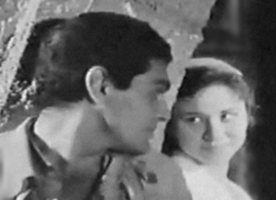
In 1959, she starred in the romantic movie Among the Ruins. In 1963, she won an award for her role in the political film No Time For Love. Faten even acted in a Hollywood crime film called Cairo in 1963.
Marriages and Film Partnerships
In 1947, Faten Hamama married director Ezz El-Dine Zulficar while they were filming Abu Zayd al-Hilali. They started a film company together. Their film Date with Life earned her the title "lady of the Arabic screen." They had a daughter named Nadia. They divorced in 1954 but remained friends, and Faten continued to act in his films.
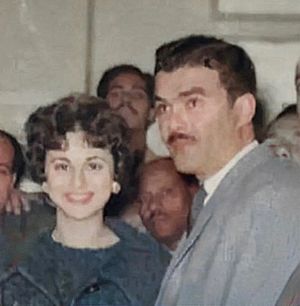
A year later, in 1955, Faten married Egyptian film star Omar Sharif. They met while filming Struggle in the Valley in 1954. Faten had never agreed to a kissing scene before, but she did with Omar. They fell in love, and Omar became a Muslim to marry her. This marriage led to many popular movies starring both of them, like Our Sweet Days and Land of Peace. They had a son named Tarek. They divorced in 1974.
Later Career and Impact
As Faten Hamama got older, she made fewer films, but they were still very successful. She also started acting in television shows. One of her first TV roles was in the mini-series Mrs. Hikmat's Conscience.
After 1993, she took a break from acting. She returned in 2000 with the popular TV mini-series Wajh al-Qamar (Face of the Moon). In this show, Faten played a role that criticized many problems in Egyptian society. The series was very popular and won the Best TV Series Award. Faten became the highest-paid actress in an Egyptian TV mini-series at that time.
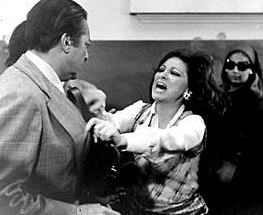
Early in her career, Faten often played weak or poor girls. But after the 1950s, she started choosing roles of strong, realistic women. For example, in Struggle in the Valley (1954), she played a rich girl who helped the poor. In Miss Fatmah (1952), she played a law student who believed women were as important as men.
Her most famous film was I Want a Solution (1974). This movie criticized the laws about marriage and divorce in Egypt. Because of this film, a law that made it hard for women to get a divorce was changed right away.
Many critics believe her most challenging role was in The Nightingale's Prayer (1959). This film is considered one of the best Egyptian movies ever. Faten played Amnah, a young woman seeking revenge for her sister. After this, Faten was very careful about the roles she chose.
Death and Tributes
Faten Hamama passed away on 17 January 2015, at the age of 83. Her son did not share the exact cause of her death.
Many people from the film industry and government leaders shared their sadness. The Egyptian president sent someone to her funeral and said she was a person of "high creative value." The Ministry of Culture announced two days of mourning. The head of the Arab League called her a "symbol of refined Egyptian and Arab art." Newspapers in Egypt honored her on their front pages.
Thousands of people attended her funeral, which was even shown live on TV. Many actors, actresses, and important figures were there. Her former husband, Omar Sharif, could not attend because he was suffering from Alzheimer's disease.
Personal Life Details
Faten Hamama's first marriage was to director Ezz El-Dine Zulficar in 1947. They were married for seven years and had a daughter, Nadia. Even after their divorce in 1954, they remained good friends.
In 1954, Faten chose Omar Sharif to act with her in a film. They fell in love during filming and married. They had a son, Tarek Sharif. They also have two grandsons, Omar Sharif Jr. and Karem Sharif. Omar Sharif Jr. is now an actor in the U.S.
Faten later married Mohamed Abdel Wahab Mahmoud, an Egyptian doctor. They lived in Cairo until her death. Faten was also fluent in French and was a practicing Muslim.
Awards and Honours
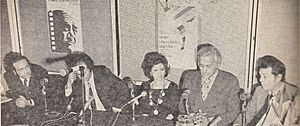
Faten Hamama received many awards for her acting throughout her career. In 1951, she won her first award for her role in I'm the Past. The Egyptian Ministry of Guidance named her Best Actress in 1955 and 1961.
She also won international awards, including special awards at the Tehran International Film Festival in 1972 and 1977. In 1973, she received a Special Award at the Moscow International Film Festival. She also won Best Actress awards at the Jakarta Film Festival in 1963 and the Carthage Film Festival in 1988.
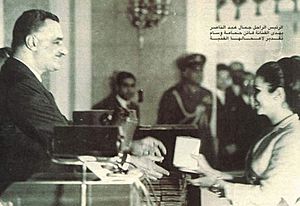
In 1984, Faten received the Lebanese Order of Merit. She was also given lifetime achievement awards at the Montpellier Mediterranean Film Festival in 1993 and the Dubai International Film Festival in 2009. In 2001, she was named "Star of the Century" at the Alexandria International Film Festival.
Other honours she received include:
- Decoration of Creativity of First Degree from Lebanese Prime Minister Prince Khaled Chehab (1953)
- Order of the Republic of First Degree for Art from Egyptian President Gamal Abdel Nasser (1965)
- Decoration of the State of the First Order from Egyptian President Anwar Sadat (1976)
- Decoration of the Cedar from Lebanese President Émile Lahoud (2001)
- Decoration of Intellectual Competence from King Mohammed VI of Morocco (2001)
- In 2013, the American University of Beirut gave Faten Hamama an honorary doctorate. She said this award made her happy and would bring joy to all artists in Egypt and the Arab world.
- On 27 May 2016, Google Doodle celebrated Faten Hamama's 85th birthday.
Selected Filmography
Film Roles
| Year | International title | Arabic title | Role |
|---|---|---|---|
| 1939 | Happy Day | Yawm Said, يوم سعيد | Aneesa |
| 1944 | Bullet in the Heart | Rossassa Fel Qalb, رصاصة في القلب | Najwah |
| 1946 | Angel of Mercy | Malak al-Rahma, ملاك الرحمة | Thoraya |
| 1947 | Abu Zayd al-Hilali | Abu Zayd al-Hilali, أبو زيد الهلالي | Caliph's daughter |
| 1948 | The Small Millionaire | Al-Millionairah al-Saghirah, المليونيرة الصغيرة | Pilot's girlfriend |
| Immortality | Khulood, خلود | Laila / Amal | |
| The Two Orphans | Al-Yateematain, اليتيمتين | Ne'mat | |
| Towards Glory | Nahwa al-Majd, نحو المجد | Suhair | |
| 1949 | Chair of Confession | Kursi al-I'tiraf, كرسي الاعتراف | Phileberta |
| Lady of the House | Sitt al-Bayt, ست البيت | Elham | |
| Every House Has a Man | Kul Bayt Lahu Rajel, كلّ بيت له راجل | Faten | |
| 1950 | Virtue for Sale | Akhlaq Lel Bai, أخلاق للبيع | Amina |
| 1951 | Son of the Nile | Ibn al-Nile, ابن النيل | Zebaida |
| Your Day Will Come | Lak Yawm Ya Zalem, لك يوم يا ظالم | Ne'mat | |
| I'm The Past | Ana al-Madi, أنا الماضي | Elham's daughter | |
| 1952 | House Number 13 | Al-Manzel Raqam 13, المنزل رقم 13 | Nadia |
| Immortal Song | Lahn al-Kholood, لحن الخلود | Wafa' | |
| Miss Fatimah | Al-Ustazah Fatimah, الأستاذة فاطمة | Fatimah | |
| 1953 | A'isha | A'isha, عائشة | A'isha |
| Date with Life | Maw'ed Ma' al-Hayat, موعد مع الحياة | Amal | |
| 1954 | Pity My Tears | Irham Dmoo'i, ارحم دموعي | Amal |
| Traces in the Sand | Athar Fi al-Rimal, أثار في الرمال | Ragia | |
| The Unjust Angel | Al-Malak al-Zalem, الملاك الظالم | Nadia | |
| Always with You | Dayman Ma'ak, دائما معاك | Tefeeda | |
| Date with Happiness | Maw'ed Ma' al-Sa'adah, موعد مع السعادة | Ehsan / Amal | |
| Struggle in the Valley | Sira' Fi al-Wadi, صراع في الوادي | Amal | |
| 1955 | Our Beautiful Days | Ayyamna al-Holwa, أيامنا الحلوة | Hoda |
| Love and Tears | Hob Wa Dumoo'', حب و دموع | Fatimah | |
| 1956 | Love Date | Maw'ed Gharam, موعد غرام | Nawal |
| Struggle in the Pier | Sira' Fi al-Mina, صراع في الميناء | Hameedah | |
| 1957 | Road of Hope | Tareeq al-Amal, طريق الأمل | Faten |
| Land of Peace | Ard al-Salam, أرض السلام | Salma | |
| Sleepless | La Anam, لا أنام | Nadia Lotfy | |
| 1958 | The Barred Road | Al-Tareeq al-Masdood, الطريق المسدود | Fayza |
| The Virgin Wife | Al-Zawjah al-Azra', الزوجة العذراء | Mona | |
| Lady of the Castle | Sayyidat al-Qasr, سيدة القصر | Sawsan | |
| 1959 | Among the Ruins | Bayn al-Atlal, بين الأطلال | Mona |
| The Nightingale's Prayer | Doaa al-Karawan, دعاء الكروان | Amnah | |
| 1960 | River of Love | Nahr al-Hob, نهر الحب | Nawal |
| 1961 | I Will Not Confess | Lan A'tref, لن أعترف | Amal |
| Don't Set the Sun Off | La Tutf'e al-Shams, لا تطفئ الشمس | Layla | |
| 1962 | The Miracle | Al-Mu'jiza, المعجزة | Layla |
| 1963 | Cairo (USA) | Cairo | Amina |
| No Time For Love | La Waqt Lil Hob, لا وقت للحُب | Fawziyah | |
| The Open Door | Al-Bab al-Maftooh, الباب المفتوح | Laila | |
| The Last Night | Al-Laylah al-Akheera, الليلة الأخيرة | Nadia / Fawziyah | |
| 1965 | The Sin | Al-Haram, الحرام | Azizah |
| Story of a Lifetime | Hikayet al-'Omr Kolloh, حكاية العمر كلّه | Nadia | |
| The Confession | Al-'Itriaf, الاعتراف | Nawal | |
| 1966 | Something in My Life | Shai' Fi Hayati, شيء في حياتي | A'ida |
| 1970 | The Great Love | Al-Hob al-Kabeer, الحب الكبير | Hanan |
| 1971 | Witch | Sahira, ساحرة | Souad |
| 1971 | The Thin Thread | Al-Khayt al-Rfee, الخيط الرفيع | Mona |
| 1972 | M Empire | Imbratoriyat Meem, امبراطورية ميم | Mona |
| 1974 | My Love | Habibati, حبيبتي | Samia |
| I Need a Solution | Oridu Hallan, أريدُ حلاً | Fawziyah | |
| 1977 | Mouths and Rabbits | Afwah wa Araneb, أفواه و أranab | Ne'mat |
| 1979 | No Condolences for Ladies | Wa La 'Aza'a Lil Sayyidat, ولا عزاء للسيدات | Rawya |
| 1985 | The Night of Fatima's Arrest | Laylat al-Qabd 'Ala Fatimah, ليلة القبض على فاطمة | Fatimah |
| 1988 | Sweet Days.. Bitter Days | Yawm Mur Yawm Hilw, يوم مر.. يوم حلو | Aisha |
| 1993 | Land of Dreams | Ard al-Ahlam, أرض الأحلام | Nargis |
Television Roles
| Year | Title | Arabic | Role |
|---|---|---|---|
| 1991 | Miss Hikmat's Conscience (mini-series) | Dameer Ablah Hikmat, ضمير أبلة حكمت | Hikmat |
| 2000 | Face of the Moon (mini-series) | Wajh al-Qamar, وجه القمر | Ibtisam al-Bostany |
See also
 In Spanish: Faten Hamama para niños
In Spanish: Faten Hamama para niños
- Bahiga Hafez
- Fatima Rushdi
- Nadia Lutfi
- Lists of Egyptians
- Top 100 Egyptian films
- Egyptian films of the 1950s
- Egyptian films of the 1960s
 | Emma Amos |
 | Edward Mitchell Bannister |
 | Larry D. Alexander |
 | Ernie Barnes |


